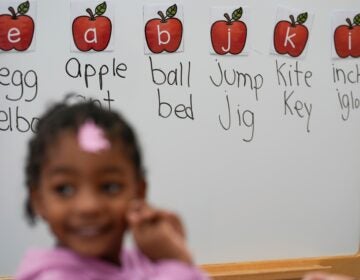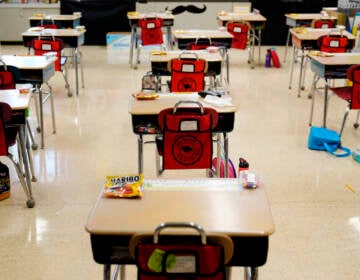Emergency fund to save Philadelphia child care gives out $1.5M in grants
The money helps centers continue to pay staff so they will be prepared to reopen. But it also pays for other needs, such as activity packets for children.

Time to read at Xavier's Family Childcare. (Huntly Collins)
This article originally appeared on The Notebook.
___
The city’s Reinvestment Fund has begun disbursing aid designed to save Philadelphia’s child care and early childhood education sector, which has been decimated by the shutdown caused by COVID-19. It has given $1.5 million in grants to 120 organizations, ranging from home-based providers to large day-care centers.
The grants come from the $7 million Philadelphia Emergency Fund for Stabilization of Early Education (PEFSEE) program, which is largely underwritten by the William Penn Foundation and Vanguard’s Strong Start for Kids Program™.
The application process opened April 6, and within the first weeks, it had received 418 responses. The grants range from $5,000 to $20,000, depending on a center’s size and the number of children served. The goal is to help them meet payroll, rent and mortgage obligations so they will be positioned to resume operations as soon as it becomes safe to do so.
“We’re looking for thoughtfulness and understanding how people can best position themselves to open on that day, whenever it is, with staff in place,” said Bevin Parker-Cerkez, the fund’s managing director for program services.
“This is an essential service,” Parker-Cerkez said, necessary to the reopening of the economy. “When people go back to work, kids need a place to go.”
Many centers are retaining their staff and paying them with state and federal subsidies, which for now are continuing to flow. However, some sources of income have stopped, including co-pays and fees paid by parents themselves.
“We have to maintain the overall goal of the program, which is retaining high-quality capacity in a sector that we have worked so hard to build,” Parker-Cerkez said. Priority in the first rounds of funding is to maintain the diversity of providers and to shore up providers in locations that are “easily accessible to the most vulnerable populations.”
The Reinvestment Fund compiled a “gap analysis” that measured the availability of high-quality child care in different areas of the city. It also prioritized communities with high concentrations of families whose incomes are less than $32,000 for a family of three (150% of the poverty level) and those with a big proportion of jobs that pay less than $15,000 per year.
Recipients include all types of providers: 46% of awardees are single-site centers; 21% are multi-site providers; 12% are home-based family providers; and 12% are group providers. Of the total awardees, 85% are women-owned organizations and 71% are owned or led by people of color.
In addition to helping the organizations to maintain their staff and keep their locations, the grants can be used for “the temporary enrichment of parent and child needs,” Parker-Cerkez said.
Some centers are providing diapers and formula to families, and some are purchasing educational kits for children to use at home. Many families don’t necessarily stock up on crayons, glue sticks, construction paper and other materials needed for learning activities.
Like local schools, many of the centers are attempting virtual learning by conducting circle time and other social meetings through online platforms, and teachers stay in regular contact with families.
“That is so crucial to maintain those lines of communication with families in this increasingly isolating world that we’re in,” Parker-Cerkez said.
While many of the centers also qualify for the Payroll Protection Program (PPP) that is part of the federal stimulus package, that application process is cumbersome and time-consuming. It also was overrun with applications, and there is a huge lag time before any award is sent.
This program “was easy to apply for, received quickly, and does not have to be repaid,” said Aliya Johnson-Roberts, executive director of the Bustleton Learning Center, which has two sites in Northeast Philadelphia. Johnson-Roberts noted that the child-care providers need the help right now.
Mary Graham, executive director of Children’s Village near Chinatown, which serves 425 children and has 116 employees, most of them full-time, said that she used her grant to pay her full-time kitchen staff of five, whose salaries would not be covered by the continued government subsidies. The federal food program, administered by the state, pays school districts and other participants based on the number of meals served – which has dwindled to zero during the pandemic.
Children’s Village reimbursement for the food program is usually $38,000 a month, she said.
“This fund is a godsend,” she said. “While the state is still paying part of the child-care fees to providers, they’re not paying the parent copays and not getting the fees from private-pay families.”
Of her grant, she is using $17,500 to pay the food service workers so they will stay and $2,500 to send a gift package to every child that includes arts and crafts materials and books.
“That is not necessarily just to give children something to do, but it’s important in maintaining relationships with families,” she said. The total cost of the gift packages is $6,000, and part of that cost is being subsidized by the school supplies company Charles J. Becker & Bros.
The Reinvestment Fund is continuing to make awards on a rolling basis, and organizations that have not received an award yet have not been denied. A list of the awardees is available here.
The Notebook’s coverage of early childhood education is funded by the William Penn Foundation.
WHYY is your source for fact-based, in-depth journalism and information. As a nonprofit organization, we rely on financial support from readers like you. Please give today.



![CoronavirusPandemic_1024x512[1]](https://whyy.org/wp-content/uploads/2020/03/CoronavirusPandemic_1024x5121-300x150.jpg)


